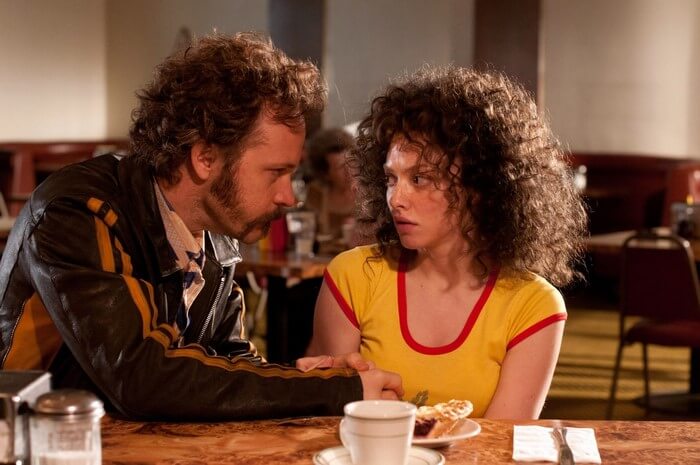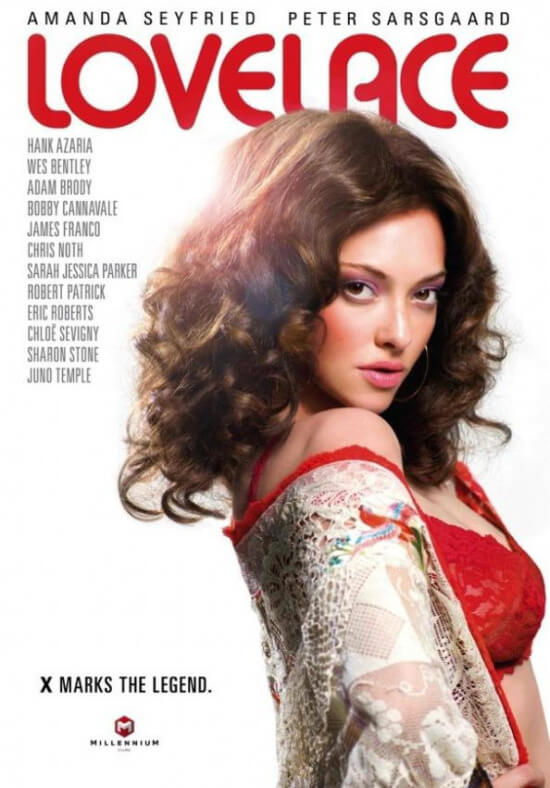Lovelace is the story of a number of Lindas, all of whom happen to be the same person and each of whom may never have actually existed.
The film tells the tale of Linda Lovelace who, in part due to her sexual prowess, became the face of 1970s porno chic after her star-making performance in the infamous adult movie Deep Throat. The poster girl of a sexually liberated America, the freckled girl-next-door was marketed as a joyous celebration of a society shaking off it's conservative history and embracing fun and self-gratification. Yet, despite outward appearances, this may not have been the full truth.
Many years before taking the pseudonym Lovelace, the Yonkers-born Linda was known by the surname Boreman and possessed a character much different than the one which earned her fame; a straight-laced daughter of deeply religious parents known for her commitment to wholesome values. Losing her virginity well into adulthood, Boreman became pregnant and was tricked by her mother (Sharon Stone), a woman prone to violent outbursts towards Linda, into giving her child up for adoption. The only way to escape her parents' strangle came with the opportunity to move in with a man who would become her husband and give her the name Traynor.
Meeting Chuck Traynor (Peter Sarsgaard) represents the turning point in Linda's story - a smooth talking, charismatic man on the surface, Traynor boasts a number of secrets he keeps far from the surface including a huge debt he aims to resolve by prostituting his wife into the world of adult movies (which is where she takes the name Lovelace). The unexpected success of Deep Throat propels Linda into super-stardom and glamorous film premieres but we find out that not everything is as rosy or saccharine as the brightly coloured, sweet smiling presentation of our young lead suggests.
Lovelace takes a Rashomon-esque approach to the narrative and at the half-way point rewinds proceedings, presenting us with a much seedier replay of the events that have preceded Lovelace's rise to fame; as Linda Marchiano, some years removed from her involvement in the sex industry, it is revealed that the tale of Lovelace is one bogged down in rape, sexual violence, emotional turmoil and coercion. Much like the original viewers of Deep Throat may have believed they were witnessing something as simple as a tongue-in-cheek piece of light, albeit graphic, adult entertainment, Marchiano's reveal pulls the carpet from under us and presents us with facts we should have been paying attention to all along - a grubby truth which makes the audience complicit with the darkness they'd just witnessed. Whilst audiences were laughing at the camp humour of Deep Throat, or being titilated by the star's oral sex skills, Marchiano informed us she was being raped on camera.
Linda Lovelace, it would seem, was not so much a willing participant in the films she made and Linda Traynor was hardly a happy wife; Chuck was a psychopathic, bullying pimp who thought nothing of loaning Linda to other men regardless of her consent and forcing himself on her to so as to consolidate his power and ownership over her. The clues that he wished to possess her were there from the start as, during a passionate moment, Traynor forces his young lover into repeating, hypnosis style, a mantra showcasing his proprietorship: "I'm your girl."
Lovelace, with it's pitch-black undertone, ominous sense of dread and explosions of misogynistic violence, is one of the toughest films to watch of the year so far yet, equally, its one of the most important too. Despite being set in the 1970s, the truths of Lovelace are as evident today as they were then. Co-directors Rob Epstein and Jeffrey Friedman present an incredible feature which show what happens when, on one hand, the religious right want to suppress sex and sexuality at all times whilst, at the other extreme, porn is a mass and growing market - there's no room for adult conversations about sex. No one in her life tells Linda about making love or that sex can be tender, loving or beautiful - it's either something shameful, evil and foul or, on the other hand, something which can be inflicted or traded as commodity. Like the character Linda Lovelace in the film Deep Throat (before she discovers her abnormally placed clitoris), it appears Linda Boreman has no idea that sex can be pleasurable. She's the product of two harmful strands of thinking about sex, both as brutal on the human psyche as the other, each of which represents the two main polemics for discussing sexuality in contemporary American society.
Lovelace acts as a harrowing, yet needed, attack on misogyny inflicted on woman both through "liberal" pornification and religious conservatism equally - it's a brave study on how misogyny breeds and grows in society and does not flinch from showing us the results of this. Linda, it would seem, was as much a victim of old fashioned conservatism as she was the more “liberated” attitudes of the time.
Lovelace is ominous from the start but this does not soften the shocking brutality when it comes in orgiastic spurts of violence. It’s a film which reveals widespread women hating – not just from men who feel disgusting entitlement, but from her religious mother who blames Linda herself for the violence perpetrated upon her (“what did you do?”) and the women who view Marchiano’s confessions with abject suspicion. As the one-time Linda Lovelace reveals to a television chat show audience her ordeal of years of violence and rape, a member of the crowd asks how they believe Lovelace can have possibly changed – despite the fact the young woman had suggested that most of her sexual performances were forced upon her or coerced, the lady in the audience seemed to suggest that once a whore, always a whore. That Linda had little to no say in her sex life seems not to matter to the mob who are venomous in their victim blaming. It’s a pre-historic attitude which still looms large today and shows why Lovelace is an incredibly relevant movie in a world where convicted rapists' sentences are commiserated by tearful news anchors .
The movie is remarkable for a number of reasons, not least the aforementioned Rashomon-esque narrative trick which points the finger indirectly at the movies audience; like Michael Haneke's Funny Games, once the smoke and mirrors have been blasted away, we're never let off from our own involvement with the film and society we're all partly responsible for. It's a bleak, pitch black movie exploring the depths of the human soul, society at its grubbiest and makes us question our role in this.
The other, potentially award winning, revelation in Lovelace is the performance of Amanda Seyfried who gives an incredibly subtle performance as each of the Lindas - her doe eyed feature manages to illuminate and emote a woman experiencing unimaginable hell and, just as equally, a lady trying her best to not betray her suffering to the outside world. At turns naive, hardened, angry, scared, playful and broken, Seyfried delivers a career (so far) best performance of a fragmented personality who will always be ultimately unknowable. At one point in Lovelace, Traynor cries down the phone looking for her in exasperated, pathetic panic, he requests of the hotel reception to be put through to Lindas “Traynor”, “Lovelace” and, ultimately, “Boreman”. None of them, to his pitiful desperation, are there and, due to the inability to ever fully pin down our elusive heroine, it’s quite impossible to state with confidence if any of these alter-egos ever existed in truth at any point at all.
* This is a very disturbing film I've had to think about for some time before writing about. I watched this with Unsalted Popcorn who gave a very well-considered, albeit, review which can be found here which happens to reflect the exact opposite view to the one I had.




This sounds like a really interesting film and I think you've reviewed it very well here - I definitely want to give it a watch and it sounds like it covers some important issues. Thanks for sharing!
Reply DeleteJess xo